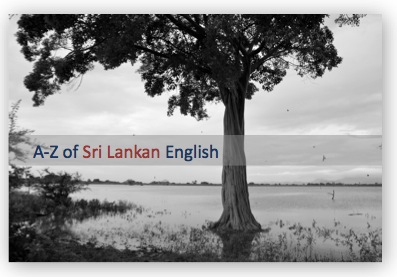Mahinda Rajapaksa makes no bones about his goday origins“ (Daily News 12/02/2010)
The basic meaning of the Sinhala word gode (or goday) is rural, of the land, of the village, conjuring up traditional pastoral values such as those the President would like to be associated with. But more often in colloquial English-speaking contexts it is used with very different connotations. It can mean unrefined, unsophisticated, common, lower class with reference to people (She“s a bit gode, no?), or flashy, gaudy, tasteless, unfashionable with reference to things (wearing a gode dress). Perhaps the nearest equivalent in contemporary British English is the slang word naff.
Isankya Kodithuwakku uses the word in The Banana Tree Crisis (the context is a mother observing her daughter with her hair braided and tied up with white ribbons, and wearing a half-sari and rubber slippers):
“Benny, can you believe this is my daughter? Me so westernized and look at this gode girl.“ (The Banana Tree Crisis, page 10)
Manuka Wijesinghe lays it on thick in Monsoons and Potholes:
“Aney those goday teachers from the village don“t know how to talk proper English,“ “ Nandamalini was a goday name, and even the acquisition of English would not remove the goday mantle from a person who possessed the unfortunate karma of being named Nandamalini. Once goday, always goday. Goday was the opposite of fashionable. (Monsoons and Potholes, page 29)
Gode is pronounced as two syllables, with a long e “ the longer the better for dragging out the devastating potential of the word. It derives from the noun godaya, which means a villager, but by extension (especially seen from an urban English-speaking perspective) a peasant, a yokel, a country bumpkin. The word is used in the Sinhala expression godayata magic, which refers to someone who is impressed or baffled by something technical or sophisticated (The first time I saw a subwoofer I was like godayata magic!). The same meaning seems to be behind this quote from The Ginir“lla Conspiracy by Nihal de Silva:
Mithra grumbles about godayas not being able to appreciate modern conveniences. (The Ginir“lla Conspiracy, page 287)
There are several colloquial variations on gode “ the Anglicised form godayatic (a godayatic accent); the euphemistic alternative G (Their new house is a bit G, no?); and other variations such as geetic or G-tic (Geetic when you say “).
###
A-Z of Sri Lankan English is“an all-new, occasional alphabetical dip“into the variety of English spoken in Sri Lanka, published exclusively on“Groundviews. The original A-Z of Sri Lankan English was published in the travelsrilanka magazine, and can be found here.

